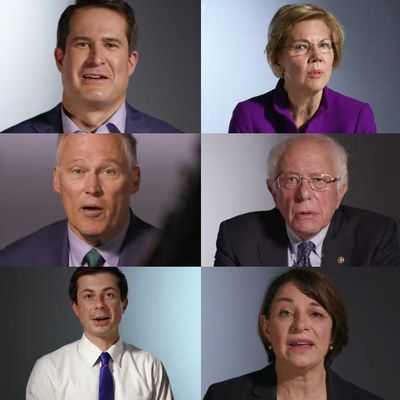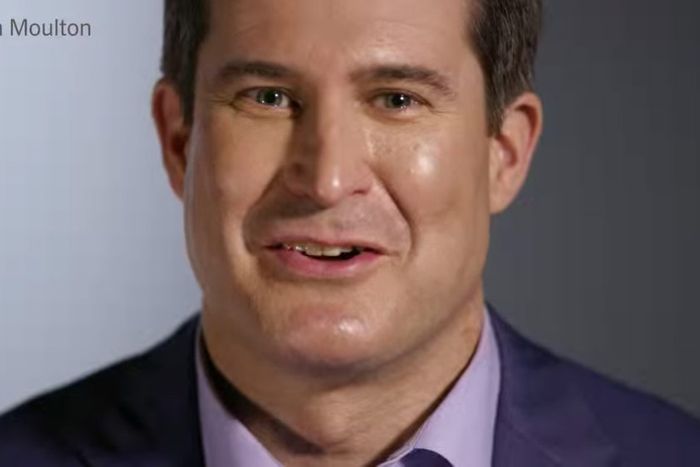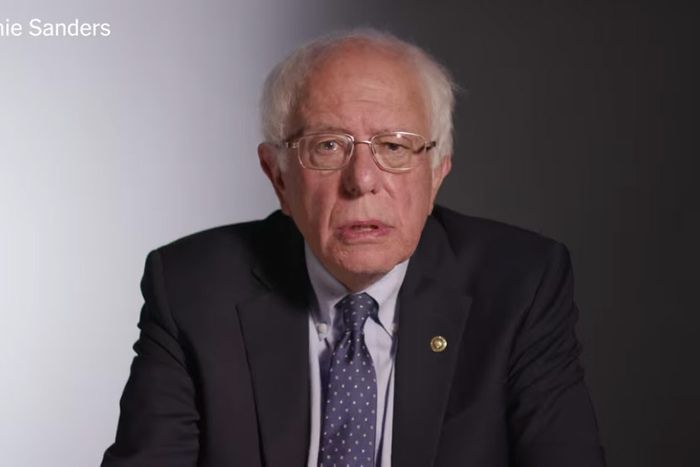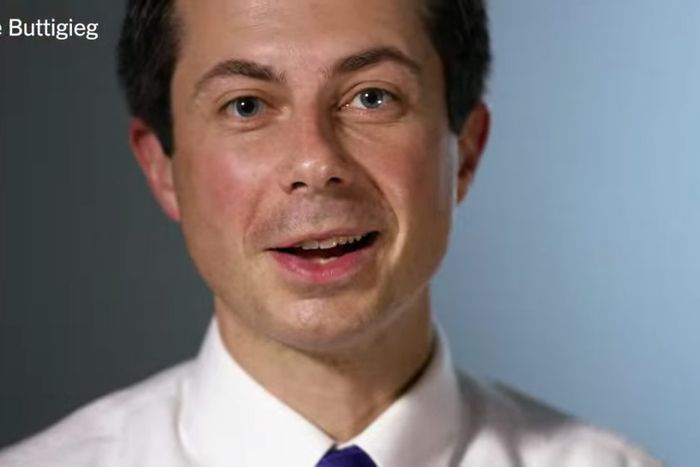
The Democratic Party’s first primary debate is still six days away. But if you can’t wait to watch Team Blue’s 2020 contenders — along with a random assortment of back-bench congressmen and rich people who got bored enough to run for president — give largely similar answers to a single set of questions, the New York Times has you covered. The paper just released a video series in which all 21 of the Democrats’ non–Joe Biden candidates answer the same 18 questions.
Here are ten quick takeaways from the Times’ interrogations:
1) Bernie Sanders isn’t open to expanding the Supreme Court. John Hickenlooper is.
Most of the ideological and policy divisions in the Democratic field are already quite clear. There isn’t that much mystery about who (officially) endorses single-payer health care and who favors a public option; who’s comfortable with drastically ramping up financial regulation and antitrust enforcement and who isn’t; who believes deficit reduction should be a priority and who does not. But on certain issues of government reform — issues that deeply shape policy outcomes on every other issue in our politics — the dividing lines are much less predictable.
Case in point: Asked whether he would be open to expanding the size of the Supreme Court (the one constitutional method that a unified Democratic government could use to override the will of an increasingly reactionary judiciary), Bernie Sanders said no. Meanwhile, John Hickenlooper and Amy Klobuchar — Democrats who are campaigning as proud centrists — said yes. And they were joined by Montana governor Steve Bullock, South Bend mayor Pete Buttigieg, Washington governor Jay Inslee, Representative Seth Moulton, bored rich man Andrew Yang, and (less surprisingly) Elizabeth Warren.
Now, most of those who said they were “open to a discussion” about expanding the High Court did not commit to pursuing any action on that front. And regardless, in the best-case scenario, what the next Democratic president thinks of reforming the Supreme Court will matter less than what Jon Tester and Joe Manchin think of it. Given that expanding the Court on a party-line vote strikes the Senate’s “democratic socialist” as an unconscionable violation of norms, it’s more or less certain that this question has no practical relevance.
That said, the fact that Sanders leans moderate on both this issue and on abolishing the legislative filibuster is interesting. For all the ways in which the Vermont senator is an outsider candidate in the Democratic race, he has also been in Congress for nearly three decades now. That long tenure in the Beltway appears to have rendered Sanders more deferential to institutional norms than relative newcomer Elizabeth Warren.
2) Seth Moulton has a large face.
You may know that Seth Moulton is a congressman from Massachusetts who mounted a very pathetic challenge to Nancy Pelosi’s speakership last year. What you may not know, until you watch the New York Times’ probing interview, is that Moulton’s face is quite large. Interestingly, Moulton has the same first name — and initials — as Family Guy creator Seth MacFarlane, whose characters also have rather large faces. Make of that “coincidence” what you will.
3) Beto O’Rourke is remarkably progressive on immigration.
Thus far, former Housing secretary Julián Castro has put forward the most transformative vision for rewriting America’s immigration laws. But the race’s other young Texan isn’t far behind. And in his interview with the Times, O’Rourke took an exceptionally uncompromising rhetorical stance on the issue.
Asked whether they think illegal immigration is a “major problem” for the United States, none of the candidates gave an unequivocal, affirmative answer. Many argued that Donald Trump exaggerated the scale of the problem for demagogic reasons, or expressed concern for the legal rights of undocumented immigrants already living in the United States, or proposed increasing aid to Central America, or pivoted to an endorsement of comprehensive immigration reform.
But only O’Rourke went so far as to suggest that undocumented immigration was actually good. “Undocumented immigration is an opportunity,” the former congressman said. “It’s an opportunity to rewrite our laws that are in accord with our values.”
4) Steve Bullock is a bit like that dude from Deadwood.
Steve Bullock is the governor of Montana. Seth Bullock was a frontiersman who moved from Montana to Deadwood, South Dakota, in the 1870s, and who was later memorialized as the protagonist of the HBO series Deadwood. This has led many to wonder whether the two Bullocks might share a lineage or spiritual essence.
The Times series sheds no light on Governor Bullock’s ancestry. But it does reveal that both Bullocks disavow blood lust — but believe there is a time and place for sending an outlaw to meet his maker. While the other 20 Democrats told the Times that they oppose the death penalty, Montana’s governor said that he supported it in “the most extreme circumstances.”
5) Jay Inslee doesn’t want you to know how much he sleeps.
In one of many lighthearted questions, the Times asked the candidates how many hours they sleep each night. All provided either a rough estimate, humble-bragged about how little they sleep, or indicated that they were getting less sleep than they should due to the campaign — except for Jay Inslee, who only said, “Just enough to have dreams at nighttime and vision statements during the daytime.”
6) Elizabeth Warren is definitely to the right of Sanders on foreign policy.
There have been many attempts to parse the distinctions between the Warren and Sanders agendas for reforming America’s political economy. I personally am not convinced that the ideological differences between the two candidates on that front (while real) will have much practical consequence, given the degree of overlap in their visions and limited powers of the American presidency. But Sanders has struck a decidedly more contrarian (and progressive) posture on foreign policy than his progressive rival. And this distinction is reflected in their responses to the question, “Do you think Israel meets international standards of human rights?”
Sanders expressed “great concerns about the role Netanyahu is playing in Israel, and their relationship with the Palestinians,” and stressed the need for the U.S. to approach the conflict in “an even-handed way.”
Warren, to her credit, described the current situation in the region as untenable, and implored the Israeli government to renew its efforts to secure a two-state solution. But she also expressed no moral qualms about Israel’s current policies or concern for Palestinians’ human rights. Rather, her answer was composed largely of AIPAC-approved talking points about the “tough neighborhood” that Israel lives in, and the necessity of the U.S. preserving its friendship with the region’s only “liberal democracy.”
There’s been some hubbub in the past 24 hours about whether the Democratic Party’s big-dollar donors view Warren as less threatening than Bernie Sanders. In my view, there’s little indication that Team Blue’s corporate wing — which is to say, party-aligned finance and tech-industry executives — sees much bright side to a Warren presidency. But the Democratic donor class also features many ideologically motivated rich people, many of whom are actually quite progressive on political economy — but uncompromising in their support for the Jewish state. To the extent that any major Democratic funders welcome Warren but spurn Bernie, I’d guess that it is this contingent.
7) Cory Booker likes something called “veggies on the go.”
Asked what his comfort food is on the campaign trail, the New Jersey senator replied, “When you are a vegan, that means lots of veggies on the go.”
I have conducted multiple Google searches in hopes of identifying the Go-Gurt of vegetables that Booker ostensibly enjoys so much. But from what I can tell, no such product exists. This has left me no choice but to conclude that by “veggies on the go,” Booker merely meant to reiterate that he is a vegan, without offering any insight whatsoever into his preferred campaign-trail comfort food.
8) Bernie Sanders is a refreshingly joyless human being.
The Times’ videos feature all the warm smiles, performative laughter, and cheerfulness that one would expect from presidential candidates answering softball “get to know you” questions. But virtually none of that willful joviality comes from Bernard Sanders. In fact, the Vermont senator looks downright miserable nearly every second he’s on-camera. And his answers to even the most lighthearted questions brim with pathos.
Asked about the last time they were embarrassed, many candidates gigglingly divulged self-deprecating tales of the time they accidentally exposed their underwear, or forgot someone’s name, or told a bad joke, or wore cargo shorts to the gym. Sanders, by contrast, said with a frown, “When I don’t do things —” He then trailed off, ostensibly discovering that his personal failures were too painful to speak. Instead, he merely said, enigmatically, “I have high expectations of myself and others.”
Meanwhile, when asked about his campaign-trail comfort food, Sanders did not fondly recall his favorite treats, but rather lamented his lack of self-control, while evincing insecurity about his body image. “Last time out, we did a trip to the West Coast, and I gained three pounds in four days, so … there’s too much comfort food,” the senator said.
Granted, it is probably an overstatement to describe Sanders as “joyless.” But his steadfast refusal to provide service with a smile when giving media interviews is distinctive and, in its own way, humanizing.
9) Mayor Pete is good at listening comprehension.
There has been some debate about whether Pete Buttigieg is aberrantly intelligent for a presidential candidate, or just aberrantly fluent in white upper-middle-class signifiers of intelligence. Regardless, the Times’ interviews help elucidate why Mayor Pete is, at the very least, good at performing intelligence. One of the paper’s trickier questions was, “Does anyone deserve to have a billion dollars?”
Many candidates interpreted this to mean, “Should we allow individuals to have a billion dollars?” or “Are billionaires inherently bad people?” But the Democratic Party’s foremost scholar of James Joyce deftly separated the paper’s literal question from its tacit one.
“I’m not sure anyone cosmically or morally deserves to have a billion dollars,” Buttigieg said. “But I don’t hold it against them, as long as it’s part of a system where there’s economic justice felt more broadly.”
10) The New York Times’ makeup and lighting crews are conspiring to reelect Donald Trump.
This is easily the most shocking revelation of the video series. It would be one thing if the Times’ crew had made one or two of the Democratic candidates look less than their best. But everyone here looks at least a little wrong. Buttigieg’s and Inslee’s cheeks are alarmingly rosy, making each look doll-like in an “uncanny valley” sort of way. Warren appears severely sunburned. Sanders looks exhausted and glassy-eyed, like he was caught unawares in the midst of sitting shiva. Bill de Blasio appears to have a mullet (granted, that one might be on de Blasio). The weight of the evidence is overwhelming. The Times’ production team has gone full MAGA.

































